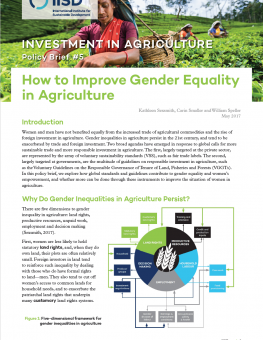
How to Improve Gender Equality in Agriculture: Investment in Agriculture Policy Brief #5
In this policy brief, we explore how global standards and guidelines contribute to gender equality and women’s empowerment, and whether more can be done through these instruments to improve the situation of women in agriculture.
Women and men have not benefited equally from the increased trade of agricultural commodities and the rise of foreign investment in agriculture.
Gender inequalities in agriculture persist in the 21st century, and tend to be exacerbated by trade and foreign investment. Two broad agendas have emerged in response to global calls for more sustainable trade and more responsible investment in agriculture. The first, largely targeted at the private sector, are represented by the array of voluntary sustainability standards (VSS), such as fair trade labels. The second, largely targeted at governments, are the multitude of guidelines on responsible investment in agriculture, such as the Voluntary Guidelines on the Responsible Governance of Tenure of Land, Fisheries and Forests (VGGTs).
In this policy brief, we explore how global standards and guidelines contribute to gender equality and women’s empowerment, and whether more can be done through these instruments to improve the situation of women in agriculture.
You might also be interested in
The Responsible Agricultural Investment Tool for Agribusiness and Case Studies
This report summarizes a collaboration to support agribusinesses in complying with principles of responsible investment in agriculture and food systems.
IISD Trade and Sustainability Review, December 2024
This edition of the IISD Trade and Sustainability Review presents four expert perspectives on how agricultural support and subsidies can promote sustainability in developing and least developed countries.
Promoting the Development of Agricultural Cooperatives
Governments in the Global South should promote agricultural cooperatives to boost smallholder access to fair markets, finance, and climate resilience.
Stabilization Clauses: The hidden provisions that can hinder tax and investment policy reform
Stabilization clauses should no longer automatically be included in contracts between states and investors. If they are, they should, at a minimum, build on the latest international standards on stabilization to avoid being a barrier to sustainable development.